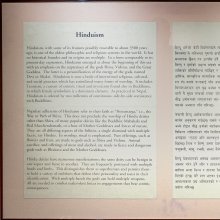Shaktirupa, Śaktirūpa, Shakti-rupa: 2 definitions
Introduction:
Shaktirupa means something in Hinduism, Sanskrit. If you want to know the exact meaning, history, etymology or English translation of this term then check out the descriptions on this page. Add your comment or reference to a book if you want to contribute to this summary article.
The Sanskrit term Śaktirūpa can be transliterated into English as Saktirupa or Shaktirupa, using the IAST transliteration scheme (?).
Images (photo gallery)
In Hinduism
Shaivism (Shaiva philosophy)
Source: SOAS University of London: Protective Rites in the Netra TantraŚaktirūpa (शक्तिरूप) refers to the “forms of Śakti”, according to the Netratantra of Kṣemarāja: a Śaiva text from the 9th century in which Śiva (Bhairava) teaches Pārvatī topics such as metaphysics, cosmology, and soteriology.—Accordingly, [verse 21.6-9ab]—“But, if [mantras consist of] the forms of Śakti (śaktirūpa), whose Śakti and of what kind? O Deva, what [does] Śakti cause, what is her purpose, and of what kind is she? If [mantras] do not possess Śakti, what is worshipped with Śakti? Independence cannot be accomplished by anyone without perfection. [...]”.

Shaiva (शैव, śaiva) or Shaivism (śaivism) represents a tradition of Hinduism worshiping Shiva as the supreme being. Closely related to Shaktism, Shaiva literature includes a range of scriptures, including Tantras, while the root of this tradition may be traced back to the ancient Vedas.
Purana and Itihasa (epic history)
Source: archive.org: Shiva Purana - English TranslationŚaktirūpa (शक्तिरूप) refers to “one who has the form of (infinite) power”, according to the Śivapurāṇa 2.5.16 (“The battle of the gods”).—Accordingly, as Brahmā and the Gods eulogized Viṣṇu: “[...] Obeisance to you of the form of Kalki; the destroyer of outcastes, Obeisance to him of infinite power (ananta-śaktirūpa) and who establishes good virtue. Obeisance to you of the form of Kapila of great soul and who expounded the doctrines of Sāṃkhya and Yoga to Devahūtī; O lord, obeisance to you the preceptor of Sāṃkhya. Obeisance to great yogin and saint who expounds the great wisdom. Obeisance to the creator of the form of knowledge whereby the soul is delighted. [...]”.

The Purana (पुराण, purāṇas) refers to Sanskrit literature preserving ancient India’s vast cultural history, including historical legends, religious ceremonies, various arts and sciences. The eighteen mahapuranas total over 400,000 shlokas (metrical couplets) and date to at least several centuries BCE.
See also (Relevant definitions)
Partial matches: Shakti, Rupa.
Ends with: Anantashaktirupa.
Relevant text
Search found 6 books and stories containing Shaktirupa, Śaktirūpa, Śakti-rūpa, Shakti-rupa, Saktirupa, Sakti-rupa; (plurals include: Shaktirupas, Śaktirūpas, rūpas, rupas, Saktirupas). You can also click to the full overview containing English textual excerpts. Below are direct links for the most relevant articles:
Cidgaganacandrika (study) (by S. Mahalakshmi)
Verse 77 [Sphurattā Śaktirūpa Mūlaprakṛti] < [Chapter 3 - Third Vimarśa]
Verse 85 [Śakti’s grace causes Sṛṣṭi and Sthiti of Jagat] < [Chapter 3 - Third Vimarśa]
Verse 148 [Samvitrūpa Śiva and Vimarśa project Īśvara—Śiva’s form] < [Chapter 3 - Third Vimarśa]
Vakyapadiya of Bhartrihari (by K. A. Subramania Iyer)
Verse 2.469-471 < [Book 2 - Vākya-kāṇḍa]
The Tattvasangraha [with commentary] (by Ganganatha Jha)
Verse 105 < [Chapter 3 - Dealing with the doctrine of both God and Primordial Matter (prakṛti)]
Yoga Vasistha [English], Volume 1-4 (by Vihari-Lala Mitra)
Chapter XII - Different aspects of yoga < [The yoga philosophy]
Lord Hayagriva in Sanskrit Literature (by Anindita Adhikari)
Serpent Power (Kundalini-shakti), Introduction (by Arthur Avalon)
